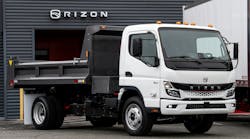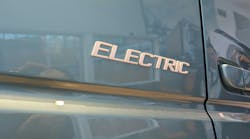Back in 2008, Indianapolis Mayor Greg Ballard created SustainIndy. As part of that initiative, which was designed to promote sustainability efforts city-wide as well as furthering the sustainability practices of the mayor's office, the Office of Sustainability was formed. That office is charged with encouraging all departments to seek sustainable ways to operate. The city's Fleet Services division is responsible for nearly 3,800 vehicles in all, everything from police vehicles to 26,000 lb. gross vehicle weight trucks, so that means greening vehicles in any way possible.
“From what I've been given as a charter, it is to make sure we are looking at [the department] holistically,” says John Williams, fleet director. “At Fleet Services, we don't [tell departments which vehicle to buy]. We try to inform them about the choices out there…We try to expand the knowledge base of alternative fuels.”
The city operates a number of hybrid vehicles, mostly Toyota Camrys and Ford Fusions, as well as vehicles running on E-85 ethanol, B20 biodiesel, and five all-electric vehicles. In all, Williams estimates that about half of the city's municipal fleet is running, or capable of running, on some alternative fuel.
And that includes its light trucks. Indianapolis is moving toward converting its F-250 pickups and E-350 vans to run on propane autogas. Some of the vehicles are purchased new, says John Hazlett, director of the Office of Sustainability, and all are between 2009 and 2011 model-year vehicles.
The propane conversion kits are supplied by Roush CleanTech. The idea to switch to propane autogas came about through Indianapolis' involvement in the Clean Cities Coalition.
“Through that membership, we had heard good things about propane autogas,” Hazlett says, pointing out that the fuel burns cleaner so there is an expectation of fewer oil changes and less wear and tear on the engine, resulting in reduced maintenance. He also said that while the fuel is not quite as efficient as gasoline, it still provides close to 95% of the efficiency of gasoline, and because its “price per gallon is significantly less” there is a monetary savings. “That's important to us because the price of gasoline is quite volatile,” he adds.
The city used available grant money obtained through the Dept. of Energy's Clean Cities FY09 Petroleum Reduction Technologies Project for the Transportation Sector to pay for the retrofits, a process that is ongoing. “We finished the retrofit of our light-duty trucks in September, and we've just received the van kits,” Hazlett says.
Approaching $10,000, the retrofit kits are not cheap, but Williams points out that it is cheaper than buying a new vehicle, and the expected savings, the city believes, will make it worthwhile.
“Even if the best-case scenario with the kit is the vehicle [costing] $8,000 to $10,000 more than a [non-equipped] F-250, if the vehicle is in the fleet for 10 years, you need $700 of savings per year to make it work,” Williams explains. “It's going to take us a good year to get some good baseline information that is usable, and then probably a couple of more years” to make decisions on the fuel's viability.
According to Roush CleanTech, there are more than 15 million vehicles on the road today worldwide powered by propane autogas, 275,000 of those in the U.S. Nearly 90% of the fuel used in the U.S. is produced domestically, the company says.
Williams notes that one of the keys to the proper analysis of the vehicles will be the monitoring of the vehicles and driver consistency. “We also know we have to keep the same drivers in the vehicles because we know how much driver behavior [affects vehicle performance],” he says.
He does not rule out expanding the use of the fuel to more fleet vehicles, including expanding beyond just the pickups and vans, but admits it's too early in the process to form any conclusions.
“The only limitation [to widespread adoption] at this point is the lack of infrastructure,” Williams says. “We know they have worked well; we know that the functionality [of the vehicles] is consistent with what we expect. As that functionality goes along [and the infrastructure is built out], we can make a decision on future expansion based on a business case.”
According to the Propane Education & Research Council, propane autogas vehicles emit 12% less carbon dioxide, 20% less nitrogen oxide, and up to 60% less carbon monoxide than gas-powered vehicles. Propane autogas used to be referred to as propane in this country, but the word autogas has been added to more closely identify it as a vehicle fuel as well as to help identify it worldwide, where the fuel is more commonly called autogas.


